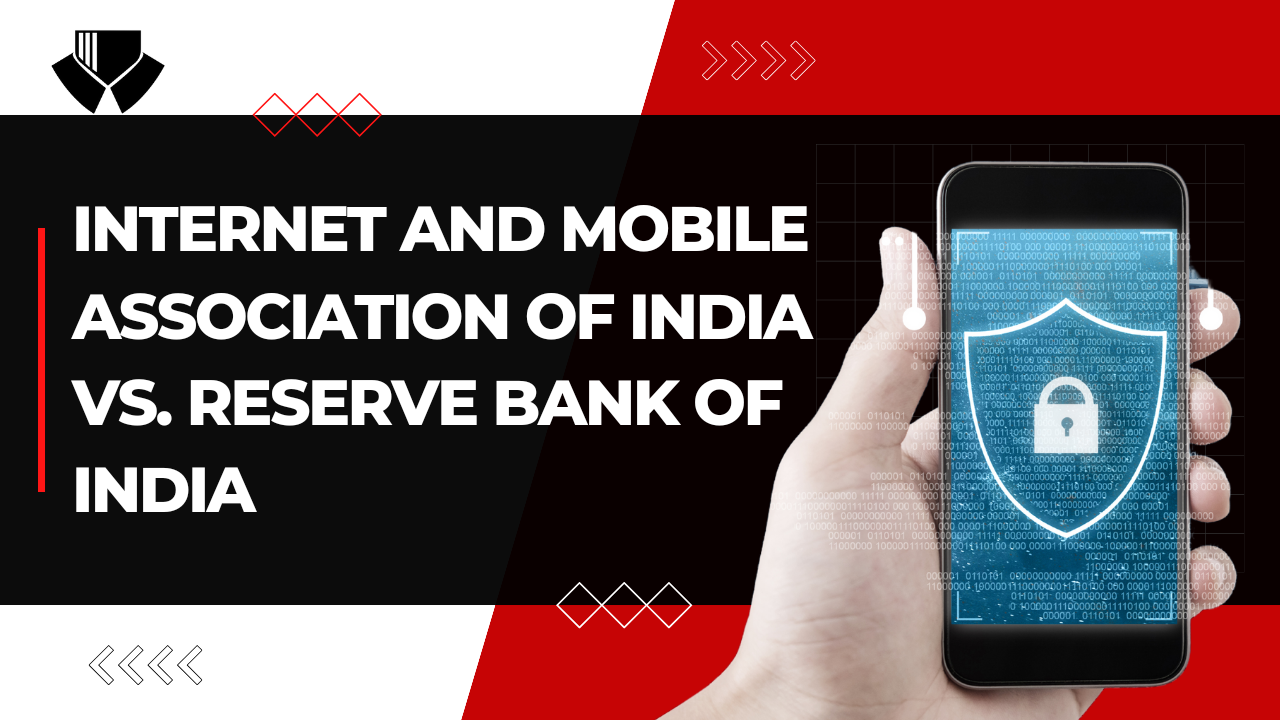This case Analysis is done by Nidhi, a 5th year law student of Institute of Law, Kurukshetra University, Kurukshetra.
Citation: W.P (CIVIL) No. 528/2018,
Judges: Justice Rohinton Fali Nariman,Justice Aniruddha Bose,Justice V. Ramasubramanian ,
Petitioner: Internet and Mobile Association of India
Respondent: Reserve Bank of India
Facts:
On April 6th,2020 reserve bank of India issued a circular on development and regulation policies in which RBI raised concern on customer protection in regards to virtual currency also known as cryptocurrency. The circular issued by RBI directed the entities not to deal with virtual currency and. to end their already existing relationship with any such individual or entities that dealt with virtual currency within three months. Such services included maintaining accounts, registering, trading, giving loans, settling, and transfer of amounts in accounts relating to the sale or purchase of virtual currency.
Moreover, RBI also directed the entities to end their already existing relationship with any such individual or entities that dealt with virtual currency within three months.
A writ petition was filed by the internet and mobile association of India which is a not-for-profit organisation, aiming to protect the interests and rights of online and mobile value added services industry . The petition challenging the action was based on the grounds that RBI lacks authority to take such a measure, rendering the circular ineffective and unenforceable. Moreover, the petitioners also raised the issue that such prohibition on cryptocurrency trade is violative of Article 19(1)(g) of the Indian constitution which provides for the right to carry out any trade or business freely
Issues:
- Whether the RBI lacks the Jurisdiction to disallow the trade of virtual currency and the decision taken by the RBI is proportionate ?
- Whether the prohibition has infringed on the Fundamental Right of freedom to trade guaranteed under Article 19(1) (g) of the Indian Constitution or is this prohibition based on the expression of public interest ?
Contentions:
By Petitioner:
- Petitioner contented that the right of freedom to practise any profession, occupation, business or trade is enshrined in Article 19(1)(g) of the constitution and any restriction of this fundamental right is required to be reasonable in nature as per Article 19(6).
And the circular had no legal basis as it put a full ban on the virtual currency which would violate article 19(G)(1) of the Indian constitution that regulates trade and business with reasonable restriction. Therefore, without any legal provision, the orders would merely amount to a violation of the fundamental right of the individual.
- The petitioner contended that RBI does Lack the jurisdiction to disallow the trade of virtual currency as virtual currency are not legal tender since virtual currency is not a legal money but a medium of exchange or store of value and is a commodity that is not covered by the Reserve Bank of India Act of 1934 or the Banking Regulation Act of 1949 . As virtual currency don’t have legal tender so RBI has no authority to prohibit the trade of digital commodities. as they do not fall within the regulatory framework.
It also asserted that the RBI has failed to recognize various types of virtual currency schemes, and that because virtual currency lacks a medium of exchange, a store of value, a unit of account, and constitutes a final discharge of debt, it cannot be recognized as money, and thus the RBI has no power to regulate it.
By Respondent:
- In response to the first contention, the respondent clarified that virtual Currencies are made of digital payment and is used as a medium of exchange and store of value, so RBI does have the power to control and prohibit such transaction. It was further contended that Virtual Currency not being a legitimate form of currency. It could also be used for illegal activities due to its anonymity or pseudo-anonymity.
- In response to the second contention, RBI argued that cryptocurrency is a stainless digital currency where trading is done by applying encryption techniques. Though the fundamental right to freedom of trade is guaranteed under the Indian Constitution, it is not an absolute right it has some reasonable restrictions. Circular which prohibited the trade of virtual currencies intended to secure public interest and to reduce fraud and illegal activities.
Judgement:
The bench ruled in favour of the petitioners. The court maintained a holistic approach to understand the technicalities of cryptocurrencies and their workings. While addressing the first issue, the Supreme Court was hesitant to accept RBIs contention that Cryptocurrency can be regarded as equal to fiat currency.
. With regards to the second issue, the Supreme Court was of the view that complete prohibition of Cryptocurrency trade and subsequent but indirect elimination of VC exchanges from the country’s industrial set up was not a proportionate measure. It had exceeded the bounds of reasonableness and held that in order for the RBI to take such an extraordinary measure, there must exist some damage suffered by the regulated entities which must be proven by providing some empirical data regarding the loss and that loss should have been caused by the operation of Virtual Currency exchanges.
The Supreme court after analysing all the raised issues declared the circular released by RBI as unenforceable and unlawful on the ground of proportionality as the respondent failed to show any damage incurred to the entities regulated by RBI.
Conclusion:
In accordance with the judgement the circular was declared unenforceable and the trading and use of virtual currency was able to take place. But in this decision the supreme court did not pass any judgement about the legality of virtual currency in India, it simply quashed the particular circular in question.
References:
- https://www.barelaw.in/case-brief-of-internet-and-mobile-association-of-india-versus-reserve-bank-of-india/
- https://dejurenexus.com/wp-content/uploads/2022/03/Case-Commentary-Internet-and-Mobile-Association-of-India-Vs.-Reserve-Bank-of-India-By-Kanishk-Sharma.pdf
- https://lawfoyer.in/internet-and-mobile-association-of-india-v-reserve-bank-of-india/#:~:text=The%20petitioner%20stated%20that%20the,Act%20of%201949%5B9%5D.


